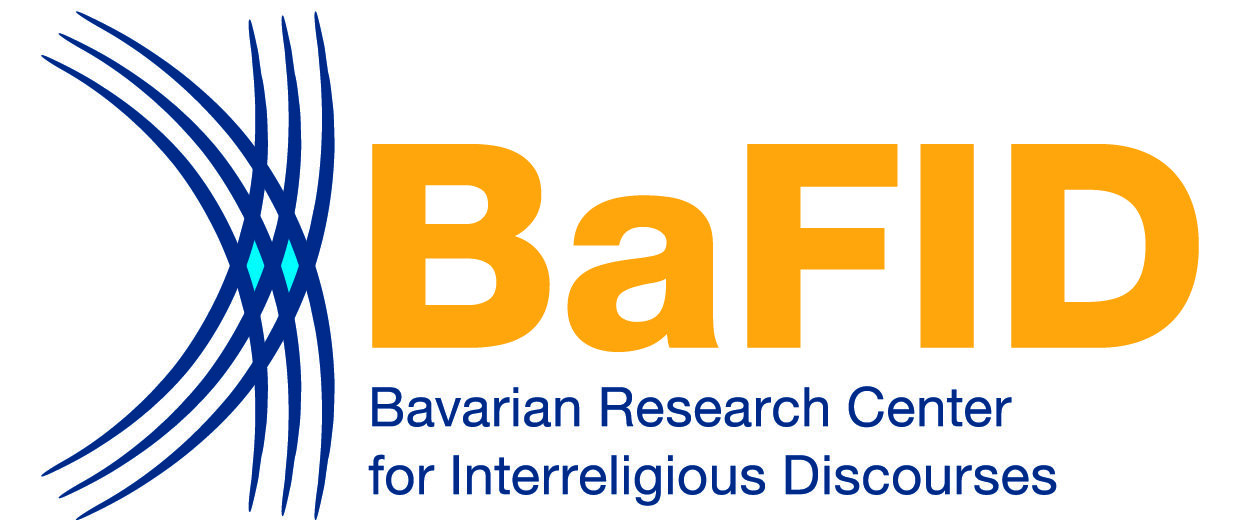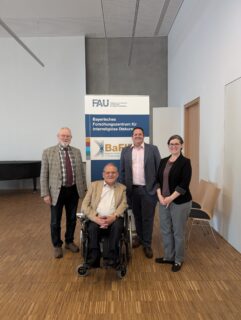Proceedings of the Conference Series “Key Concepts in Interreligious Discourses”
The Concept of Prophecy and the Concept of Spiritual Beings in Judaism, Christianity and Islam
Meeting of the conference series “Key Concepts in Interreligious Discourses”, Friedrich-Alexander-University Erlangen-Nürnberg, 26.-28. June 2024
There are concepts that occur in all three major monotheistic religions. However, it would be premature to deduce from the conceptual agreement alone that Judaism, Christianity and Islam understand the same concepts across time and religious boundaries. Central concepts such as revelation, peace or corporeality, which have already been the subject of the conference series in recent years, have both a different history of impact and systematic meaning in the religions. Although there are similarities between the religions, there are also many differences.
The Key Concepts in Interreligious Discourses (KCID) conference series has been dedicated to this since 2016. Since the founding of the Bavarian Research Centre for Interreligious Discourses (BaFID) in 2020, the conference series has been organized and hosted by this center. The BaFID is dedicated to the study of Jewish-Christian-Islamic discourses in the past and present. The KCID conference series, which takes place three times a year, plays a central role in the center’s work.
The aim of the conferences is to create a reliable academic basis for interreligious relations and to strengthen mutual understanding. Leading international academics in their respective fields were once again invited to contribute to this endeavor. The two main topics of this year’s summer conference were prophecy and spiritual beings.
The Concept of Prophecy in Judaism, Christianity and Islam
The first day of the conference was dedicated to the concept of prophecy, which has an important, albeit different, meaning in all three religions.
Prof Dr Howard Kreisel from Ben-Gurion University of the Negev opened the conference with a lecture on the concept of prophecy in Judaism. He focused on the philosophy of Maimonides and his ideas on prophecy. According to Kreisel, the appeal of Maimonides’ explanations of prophecy lies in the fact that he philosophically explores the supernaturalistic aspect of prophecy. According to Maimonides, prophets are people with great intellectual abilities and moral perfection; they are able to interpret the signs of the times. These views are thus in stark contrast to the traditional rabbinical views of prophecy, in which election by God is a prerequisite.
Prof Dr Marco Frenschkowski from the University of Leipzig shed light on the Christian understanding of prophecy. He explained that in the Christian tradition, prophecy was understood both as the prediction of future events and as the proclamation of God’s will. Frenschkowski examined the biblical foundations of prophecy, particularly the role of the prophets in the Old Testament and their fulfilment in the New Testament through Jesus Christ, which is seen as problematic in relation to Judaism today. He also discussed the continuation of the prophetic tradition in ancient Christianity and the distinction between true and false prophets, which plays an important role as an identity marker, especially in the Pauline letters. He emphasized that prophecy in Christianity has an egalitarian dimension and that, in principle, all believers can have a prophetic role.
Prof Dr Zishan Ghaffar from the University of Paderborn shed light on the concept of prophecy in Islam. He began with a brief phenomenology of Islamic prophetology and explained the Quranic distinction between prophecy, prophethood and prophets. Ghaffar illustrated the limits of prophetic abilities by analyzing verses from the Koran: Prophets are neither omniscient nor in possession of divine treasures, but merely transmitters of divine revelations, he said. A special feature of Quranic prophecy is that it is always anti-apocalyptic despite its eschatological claims. According to Ghaffar, this distinguishes the Qur’an from the prophetic-apocalyptic war propaganda of the environment in which Islam was formed.
In the ensuing discussion, it became clear that in all religions there were endeavors to end the time of prophecy – be it through Malachi, John the Baptist or Muhammad, as the last prophet in each case. Nevertheless, people who either claim to be prophets themselves or are regarded as such by others appear again and again in the history of religion. A coherent typologisation of prophecy is therefore almost impossible to achieve in the history of religion in all three religions.
The Concept of Spiritual Beings in Judaism, Christianity and Islam
Even before the lectures on the second day, it was clear that angels have a special role to play among spiritual beings. It is therefore not surprising that ideas and meanings of angels took up a great deal of space in the lectures and the subsequent discussion.
Prof Dr Mika Ahuvia from the University of Washington in Seattle opened the conference with a lecture on spiritual beings in Judaism. She explained the diverse roles and representations of angels and other spiritual beings in Jewish tradition, drawing on both biblical and non-biblical sources. Ahuvia emphasized the protective and healing functions of angels, as expressed in magical texts and amulets from late antiquity. She also explained the close connection between angels and the divine presence as well as the development of the concept of angels in Jewish mysticism and liturgy.
Prof Dr Friedrich Reiterer from the Paris Lodron University of Salzburg spoke about the concept of spiritual beings in Christianity. He began with an examination of the different ontological levels as described in the Bible: the material world, the world of spiritual beings and the sphere of God. In the Old Testament, angels fulfil an intermediary function between God and man. Reiterer emphasised the variety of biblical terms and descriptions for spiritual beings, including angels, seraphim, cherubim and demons. He also emphasised the role of these beings as messengers and protectors. In addition, he addressed the developments of the doctrine of angels in church tradition and their influence on Christian art and liturgy. The question of the role of the Holy Spirit in comparison to angels dominated the discussion. Even though the Holy Spirit largely assumes the role of mediator between God and humans in the Christian tradition, angels continue to play an important role in their function as protectors and indicators of the sacred.
Dr Stephen Burge from the Institute of Ismaili Studies in London concluded the conference with a lecture on spiritual beings in Islam. He explained the different categories of angels, jinn and demons and their roles in Islamic theology and folklore. Burge used semiotic squares to illustrate the complex relationships between these beings and humans. He explored the binary opposites of light and darkness, benevolence and malevolence, and obedience and disobedience. While angels and demons can exert either positive or negative influences on human life, the Islamic concept of the jinn is enriched by a category that defies the good-evil dichotomy and has a will of its own. He emphasised this as a major difference to angels in the Islamic tradition, who do not oppose the will of God – unlike in Christianity.
The conference ‘The Concept of Prophecy and the Concept of Spiritual Beings in Judaism, Christianity and Islam’ offered an in-depth insight into the complex and diverse concepts of prophecy and spiritual beings in the three monotheistic religions. The presentations and subsequent discussions revealed both the similarities and differences in the respective traditions and the significance of these concepts for religious understanding and practice today. The participants and speakers were able to take away important impulses for their own research from the discussions, which will also be reflected in the publication of the revised lectures. The contributions will be published next year in the book series ‘Key Concepts in Interreligious Discourses’ (KCID) by De Gruyter. The book series brings together in-depth studies on key concepts in Judaism, Christianity and Islam in a discursive examination of the various religions. As in previous years, the lectures will be published as videos on the BaFID YouTube channel[1] in order to make the contributions accessible to the public in a timely manner.
By Gerrit Mauritz
Bavarian Research Centre for Interreligious Discourse, FAU Erlangen-Nuremberg
[1] https://www.youtube.com/@bafid2020
Place of publication: Cibedo-Beiträge 2024/Heft 3

